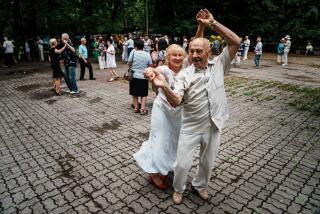Moscow’s Kievsky Station: Exodus From the Ukraine Keeps It Abuzz
- Share via
MOSCOW — There was uncertainty on the faces of children and adults alike as they arrived by rail Saturday from the Ukraine, the latest drops in a human wave generated by the nuclear power plant accident at Chernobyl.
But their solemn looks often dissolved into smiles as grandmothers or young women with bunches of tulips, carnations and lilacs rushed up to embrace friends and family members who came to Moscow from Kiev.
For the past four days, up to 10 trains a day from the Ukrainian capital have pulled into the Kievsky railway station here, setting the cavernous halls of the Stalin-era building abuzz.
Muscovites arriving late to meet a train dash up to other people, inquiring about arrival platforms. Tired new arrivals still waiting to be greeted lean against walls, surrounded by knapsacks and bulging bags.
The number of arrivals from Kiev has sharply increased since last week. So has the number of police who have asked at least three Western reporters to leave after they questioned arrivals about the accident at the nuclear plant 60 miles north of Kiev.
Outside the station, militia and civilian volunteers in red armbands use megaphones to maintain order.
As trains of up to 20 cars each lumber into the station, uniformed guards stand at the open doors of each car. Behind them, travelers eager to end their journey crowd the corridors.
Others stay in their compartments, noses pressed against the windows, eyes scouring the platform for a familiar face.
For many, there is an unexpected family reunion, or a meeting with a relative they have never seen.
“Look, this is Grisha,” one woman said, proudly showing off her grandson to a friend who met them at the station Saturday.
“He’s grown a lot, hasn’t he?” murmured one young woman to another as they waited for a teen-age acquaintance they had already spotted from the platform.
Children of all ages pour off the trains. Most assure inquiring reporters that “everything is normal, everything is calm” in Kiev, the Soviet Union’s third-largest city, and several assert that their travels were planned long in advance.
Some admit, however, to worrying about children.
“Quite a few people are leaving,” said a woman in her 50s from Kiev. “They say on the radio that everything is fine, but people with children still want to get them out.”
More to Read
Sign up for Essential California
The most important California stories and recommendations in your inbox every morning.
You may occasionally receive promotional content from the Los Angeles Times.













